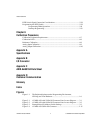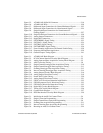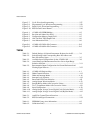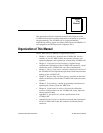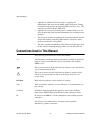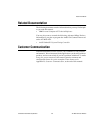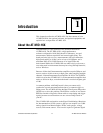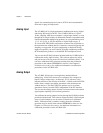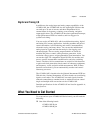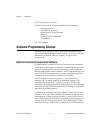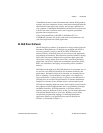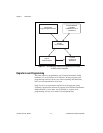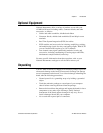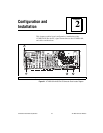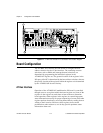
Chapter 1 Introduction
AT-MIO-16X User Manual 1-2
©
National Instruments Corporation
signals for communication and control. SCXI is the instrumentation
front end for plug-in DAQ boards.
Analog Input
The AT-MIO-16X is a high-performance multifunction analog, digital,
and timing I/O board for the PC. The AT-MIO-16X has a 10 µsec,
16-bit, sampling ADC that can monitor a single input channel, or scan
through the 16 single-ended or 8 differential channels (expandable with
National Instruments multiplexing products) at a programmable gain of
1, 2, 5, 10, 20, 50, or 100 for unipolar or bipolar input ranges. A
512-word ADC FIFO buffer can perform seamless data acquisition at
the maximum rate without data loss. Internal or external triggering and
sampling are supported. If signal conditioning or additional analog
inputs are required, you can use the SCXI signal conditioning modules,
SCXI multiplexer products, or the AMUX-64T multiplexer board.
You can use the NI-DAQ software included with the AT-MIO-16X to
calibrate the analog input circuitry. This software adjusts the offset
and gain errors to zero by means of board-level calibration DACs. You
can store calibration DAC constants resulting from the calibration
procedure in the onboard EEPROM for later use. See Chapter 6,
Calibration Procedures, for additional information on calibration
procedures for the AT-MIO-16X.
Analog Output
The AT-MIO-16X also has two deglitched, double-buffered,
multiplying, 16-bit DACs that may be configured for a unipolar or
bipolar voltage output range. An onboard, +10-V reference is the
internal reference to the circuitry of the DAC. A 2,048-word DAC FIFO
buffer allows seamless waveform generation at the maximum rate
without data loss. The DAC FIFO can perform cyclic waveform
generation directly from the FIFO, independent of the PC interface.
You can use the analog output circuitry for internal timer and external
signal update capability for waveform generation.
You calibrate the analog output circuitry through the NI-DAQ software
provided with the board. This software adjusts the DAC offset and gain
errors of each channel to zero by means of board-level calibration
DACs. Calibration DAC constants resulting from the calibration
procedure may be stored in the onboard EEPROM for later use. See
Chapter 6, Calibration Procedures, for additional information on
calibration procedures for the AT-MIO-16X.



